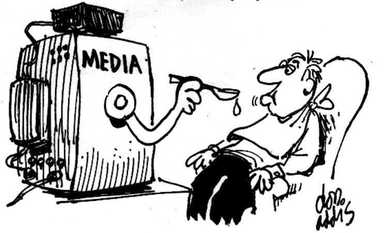When the concept of media literacy was introduced in class, I would not say that anything necessarily surprised me in the presentation. I had always known that it was difficult sometimes to find a reliable news source or station because of reporters' biases or misconceptions. Here is a choice clip from the Daily Show only supporting this fact, if you are interested:
http://thedailyshow.cc.com/videos/lkmdal/fox-news--false-statements.
I had always known that ads exaggerated and stretched the truth. The only advertisements that I somewhat tolerated were the Superbowl ads and any others that used humor as a selling point. Those I found less annoying. However, despite my annoyances with the ads, I found myself falling for them. Whenever an ad came on describing the amazing effects of this new makeup or hair product, it would prompt me to go online, research it some more to see if it was worth it, and then possible buy it. When I saw the new meal that Applebee's was serving on the TV, the next time my fiance and I went out for dinner, I would suggest that we go there. Despite my awareness of the lies and exaggeration that ads live on, I am still a sucker for it. However, it is better that I have some kind of awareness versus none. That is why the very impressionable kids of this generation need to be taught how to combat the onslaught of pictures, videos, and words that are trying to convince them of how or what they should decide.
 |
| Avoid this. |
I do not think that there needs to necessarily be a class every day discussing this topic in a school, but I think that perhaps a teacher, whether it be the homeroom or the technology/keyboarding teacher, should use this topic to lead class discussion at least a few times a month. Whether the teachers follow a set program for media literacy or come up with it on their own, their students need to know that they are being lied to several times a day by the media. They need to know how to respond to these falsehoods being shoved into their retinas. The task of a school is to mold these minds into well-balanced, intelligent, hard-working, responsible members of the human race. Knowledge about media literacy encourages the children to not only use deductive reasoning to uncover the deceptive "truths" but to also internally reflect on their own beliefs. Media literacy will not only make the students question what the media is trying to make them believe but also what they believe themselves. Media literacy might not be the first time where students mediate on who they are, but it could be another stepping point to full self-realization.
I cannot see anything negative about teaching this topic in schools. I believe that it will engage most students because they can all relate to it since it is something that they are surrounded by every waking moment of their lives. It will teach the students how to uncover the truth and their own person-hood at the same time. Plus, you get to watch videos for an entire class period.
 |
| And only a neanderthal would whine about that. |
Ads are everywhere whether we like it or not, and it is only becoming worse. Obviously they work or else the companies who spend the money to produce the ads would not have money left to produce them. Our world is obsessed with beautiful people, things, and ideas. Ad companies pounce on that and eat that as their bread and butter. We are duped whether we are aware of it or not. The scary prospect is that we can be unconsciously fooled into buying or believing something. That is why I believe that this generation needs to have an awareness of what they are being force fed if you will. The children of this age are surrounded by flashy modern technology that never give them a moment's peace. These young minds need to be taught how to find the truth amid the noise and confusion. They must be pushed out of their ignorance and complacency and be fighters for what they believe is right and true.



This is a great reflection, Lexi. Very well written. Don't forget to include image sources- that's part of media literacy best practices!
ReplyDelete